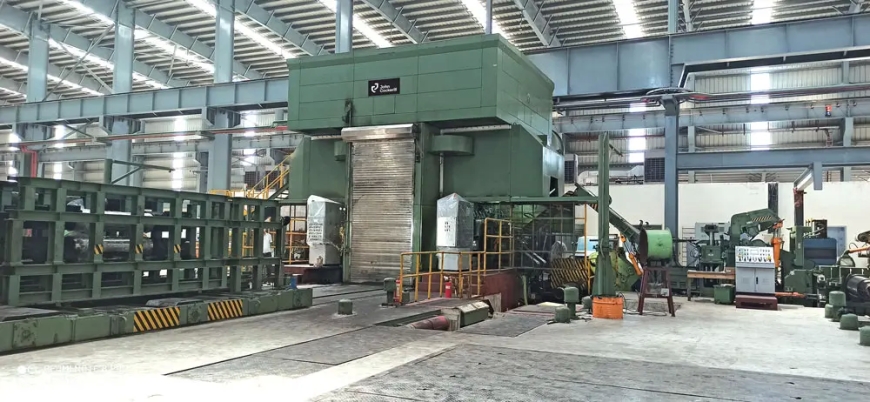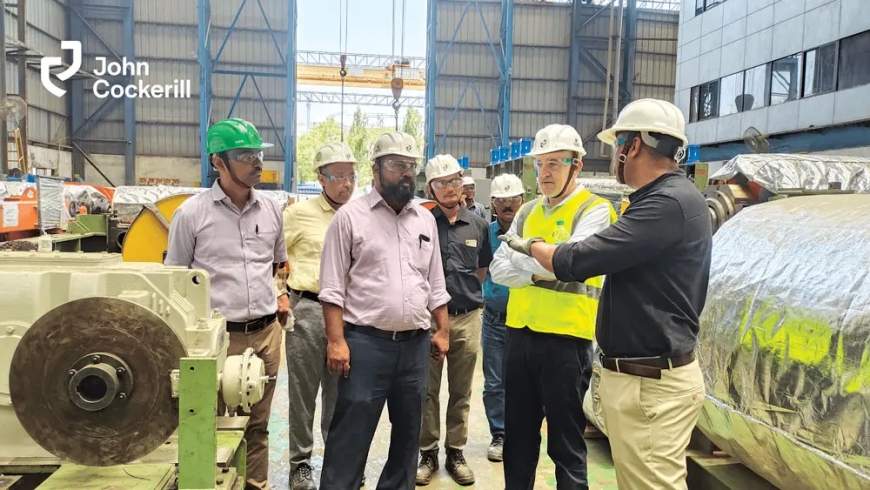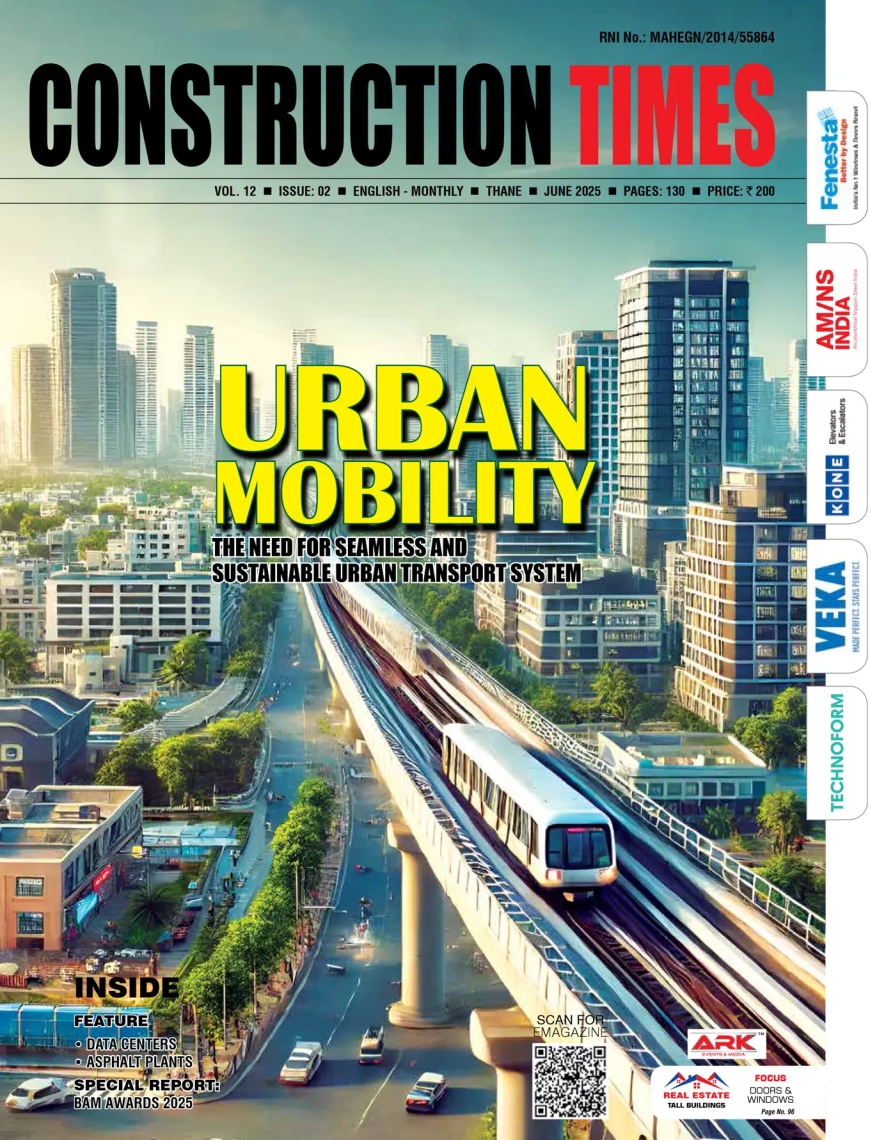We prioritise sustainability with technologies like waste heat recovery and carbon capture.

Michael Kotas
Managing Director, John Cockerill India Ltd
How do you view the current market scenario of Indian steel industry? How is construction industry playing a key role in the growth of steel?
The steel industry has been a driving force behind India’s economic growth and continues to play a pivotal role as the country moves towards accelerated development. With India now the world’s second-largest producer of crude steel, recording an output of 125.3 million tonnes in 2022-23 and showing an 11.8% increase in the first five months of 2023-24, the sector is set for significant expansion. This growth is largely driven by the government’s focus on large-scale infrastructure projects, such as the Smart Cities Mission and the development
of highways, bridges, and urban
spaces.
The construction sector, which consumes 60-65% of the steel produced in India, is a key contributor to this surge in demand. At John Cockerill India Limited, we recognise the crucial role construction plays in shaping the future of the steel industry. In response to this growing demand, we offer customised solutions to improve the efficiency and sustainability of construction projects. Our capabilities range from turnkey engineering and complete line integration to specialised equipment supply for new, expansion, and modernisation projects.
As urbanisation accelerates and government initiatives unfold, the demand for steel will only increase.
How is the company evolving as an important player in India for steel industry?
Since its incorporation in 1986 and following its acquisition by the John Cockerill Group in 2008, John Cockerill India Limited has established itself as a key player in the Indian steel industry by providing innovative engineering solutions and high-performance project management that enhance efficiency, productivity, and sustainability. John Cockerill Industry’s approach towards growth focuses on organic expansion, strategic partnerships, and acquisitions, all of which are aligned with the sector’s 2030 vision that emphasises key markets, regionalisation, and decarbonisation. Our recent successes, such as securing major orders from leading steel manufacturers like Tata Steel and The Tinplate Company of India for advanced processing lines, reflect our commitment to driving excellence in the industry. With state-of-the-art workshops in Taloja and Hedavali, equipped with cutting-edge machinery, John Cockerill India consistently delivers product quality, improved production performance, and adherence to rigorous safety standards. This positions us as a trusted partner for both domestic and global steel producers, reinforcing our standing as a vital contributor to India's steel industry.

What are the major technologies driving efficiency and sustainability in steel manufacturing?
The steel manufacturing industry is undergoing significant transformation driven by various technologies aimed at enhancing efficiency and sustainability.
Automation & robotics: The integration of automation and robotics has revolutionized steel production processes. Automated systems streamline operations, reduce manual labour, and enhance precision in manufacturing. For instance, robotics is used for tasks such as material handling and quality inspection, leading to increased productivity and reduced error rates.
AI and Data Analytics: Advanced analytics and machine learning technologies enable real-time monitoring and optimisation of production processes. These tools analyse vast amounts of data to predict equipment failures, enhance maintenance schedules, and improve overall operational efficiency. This predictive capability helps manufacturers maintain high product quality while minimising downtime.
Waste Heat Recovery Systems (WHRS): These systems capture excess heat generated during steel production processes and repurpose it for other applications, such as preheating raw materials or generating electricity. This not only improves overall energy efficiency but also reduces operational costs associated with energy consumption.
Carbon Capture, Utilisation, and Storage (CCUS): CCUS technologies are essential for reducing the carbon footprint of steel production. These systems capture CO2 emissions from the manufacturing process, allowing for their utilisation in other applications or storage to prevent release into the atmosphere.
At John Cockerill, we are aligned with these cutting-edge technologies and are playing an integral role in supporting India’s decarbonisation agenda. Our focus is on providing customised solutions that support customers in their energy transition journey, helping them reduce their carbon footprint while improving operational efficiency. By leveraging innovations in automation, AI, WHRS, and CCUS, we are committed to enabling a more sustainable and energy-efficient future for the steel industry in India.
How are your solutions making an impact in the Indian steel sector?
At John Cockerill India, we are playing a key partnering role in delivering innovative solutions that drive the transformation of India’s steel sector. Our engineering solutions are making a significant impact by enhancing production efficiency, conserving energy, and reducing emissions. For instance, our integrated automation systems streamline production processes, boosting output and minimising bottlenecks. We also prioritise sustainability with technologies like waste heat recovery and carbon capture, helping steel manufacturers meet stringent environmental regulations. These efforts align with India's broader goals of achieving self-sufficiency and fostering sustainable growth in the steel industry.
John Cockerill also plays a critical role in improving the performance of steel and non-ferrous production facilities while making them more resource-efficient and environmentally friendly. Through advanced techniques such as Jet Vapour Deposition (JVD), we provide innovative solutions that enhance the competitiveness of our customers.
Furthermore, as hydrogen becomes a key driver of green steelmaking, our extensive knowledge of the steel value chain, combined with our high-performance alkaline electrolyzers and integrated project execution solutions, enables steelmakers to produce green hydrogen. This hydrogen serves as a reducing agent in the steelmaking process, significantly cutting the end-to-end production cost.
Looking towards the future, we are at the forefront of green steel innovation with our VOLTERON technology, which is designed to enable CO2-free steelmaking alongside significant energy reductions. This cutting-edge electrolytic process aims to reduce direct energy consumption by 31% and greenhouse gas (GHG) emissions by 87% compared to conventional steelmaking, positioning us as leaders in sustainable steel production.
What are your future expansion plans in India?
John Cockerill India is committed to expanding its footprint in India through both geographical growth and technological leadership. Our expansion plans are built around several key initiatives:
Strategic collaborations: We are focused on strengthening partnerships with leading steel manufacturers and the government to meet the increasing demand for advanced steel products across sectors such as infrastructure, automotive, and consumer goods. These collaborations will be instrumental in driving growth and innovation in the Indian steel industry.

Technological advancements: Investing in research & development is central to our strategy. We aim to introduce cutting-edge technologies like smart manufacturing, advanced robotics, and energy-efficient solutions specifically tailored to the unique needs of the Indian market.
Capacity expansion: As India works towards its goal of increasing steel capacity to 300 million tonnes by 2030-31, we are scaling up our engineering capabilities to support both new and ongoing projects. This expansion will allow us to continue delivering high-quality solutions that drive efficiency and sustainability in the industry.
Sustainability initiatives: Aligned with our 2030 vision of regionalisation, decarbonisation, and strengthened local partnerships, we are expanding our portfolio of sustainable solutions. This includes integrating renewable energy into steel production and exploring the use of alternative raw materials. These efforts are aimed at not only meeting India's growing steel demand but also ensuring that it is done in an environmentally responsible way.
What is your Mission 2025 for the company?
John Cockerill India Limited's ‘Mission 2025’ aims to position the company as a leading force in providing sustainable and innovative industrial solutions that support India's transition to a low-carbon economy. The mission focuses on key strategic pillars that align with global environmental and technological advancements:
Sustainability leadership: We are committed to decarbonising the steel industry by developing and implementing green technologies, such as waste heat recovery, carbon capture, and eco-friendly acid regeneration systems. Our goal is to reduce energy consumption, lower emissions, and promote the use of sustainable materials in steel manufacturing.
Technological excellence: John Cockerill India aims to become the preferred technological partner for steel manufacturers by integrating advanced automation, AI-driven production optimisation, and Industry 4.0 solutions into our offerings.
Global expansion: We plan to strengthen our global presence by expanding exports to key international markets, particularly in regions like Africa and Southeast Asia, where there is a growing demand for advanced steel manufacturing solutions. Our international strategy includes leveraging our local
expertise and facilities to deliver innovative, cost-effective solutions that meet regional needs.
Innovation and R&D: Continuous investment in research and development is at the core of our strategy. By pioneering next-generation technologies, such as the E-Si® Mill for advanced electrical steels and new high-performance cooling technologies, we ensure that we stay ahead of industry trends and contribute significantly to the global steel industry's transformation.
Through Mission 2025, John Cockerill India Limited is not just supporting the growth of the Indian steel industry, but also aligning this growth with global sustainability and technological advancement goals.





